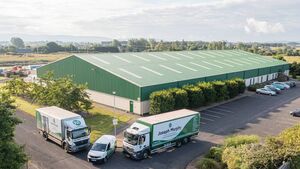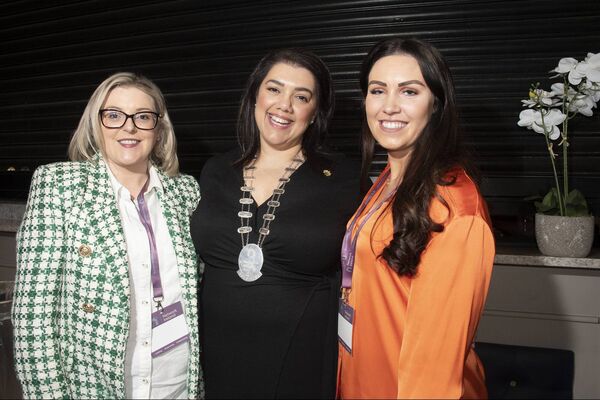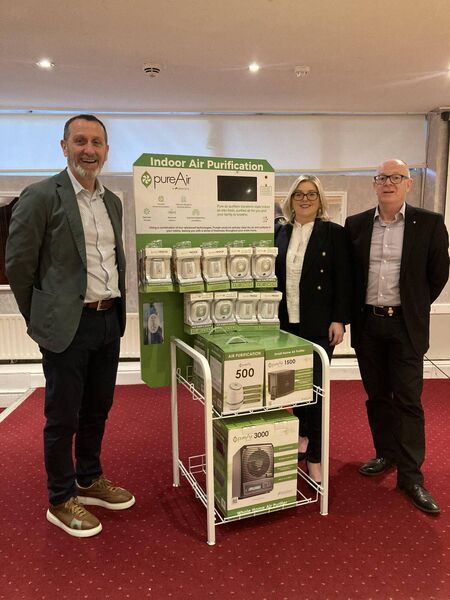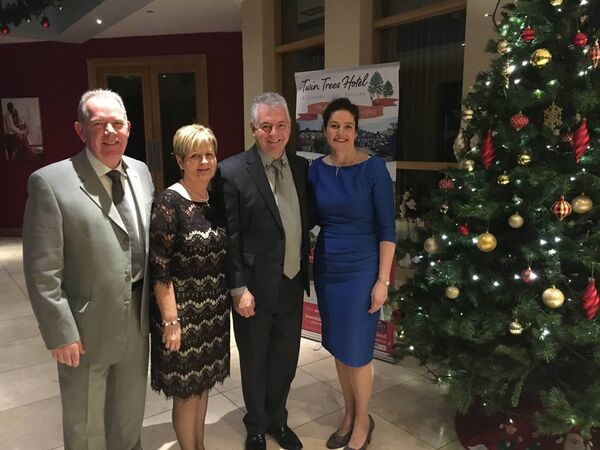Distance is no obstacle for ambitious Ballina firm

Joseph Murphy Ltd is one of Ballina's oldest businesses, having been established in 1916.
In the latest in the series where I interview leaders from different sectors, I talked with Lorraine Burnell about the importance of the SME business sector in our region. SME stands for Small and Medium Enterprises, and in general terms refers to any business with fewer than 250 employees. They are the lifeblood of every community in the West: every community is proud of their successful local SMEs. Many are family owned; many in business for generations. They provide good local employment and remain close to their customers as they compete in the globalised world.
As Managing Director of Joseph Murphy Ballina Ltd, Lorraine knows all that ground well – the attributes you need to lead such businesses, their particular challenges, and what more can be done to support them into the future. The Belmullet native’s career took off in Galway where she got a start in a firm by knocking on their door, ended up doing the accounts, then studying at night to become a Certified Accountant.
At 24, life brought her to Birmingham where in a new role she quickly rose through the ranks until ultimately leading the firm, turning the business into a great success, and all in a very male-dominated sector. She is a great believer in the value of that time abroad.
“I had 12 years of experience in the UK, and came back with 30 years of knowledge.”
Passionate about her work and career and with rapid success under her belt, but also thinking about the truly important things in life, she began to consider coming home and what it might mean. This is a tale as old as time in the West – a bright young person heads off to Big Smoke, does well, and then wants to come home but fears that they might have to make a career sacrifice to do it.
But when Lorraine met Sean Lavelle at Joseph Murphy's, she knew that this was a perfect alignment, in a firm that “provides good jobs for local people, supports families to rear their kids and where we all want to be proud driving in and out the gate each evening”.
Founded in 1916, Joseph Murphy is a wholesale hardware distributor, supplying agricultural, gardening, household, electrical, DIY, paints, and building products throughout Ireland. My mother tells me that my grandfather, coincidentally also born in 1916, sold the firm seed potatoes long ago.
The late 1990s saw much change with Sean Lavelle becoming the majority shareholder and with a relocation to its purpose-built 40,000 sq ft warehouse. The Lavelle family are very much involved in the running of the business and so the family ethos behind it continues. While the business may have changed ownership its ethos was - and remains - to supply quality products at competitive prices to their customers.
In recent years, the company has developed the Moy Tools range and even more recently has gained exclusivity as the only supplier to retailers of pureAir air purification units in the Irish and UK market. Lorraine is enthusiastic about this new territory for the company.
“We’re excited about this new chapter for the business as we distribute pureAir units, which we know improves air quality – with all sorts of benefits – in the home and work environment.”

With more than 700 business customers already across Ireland and abroad, the company has ambitious plans to grow, with the Moy brand and the pureAir range key tools for them to do it. Lorraine Burnell is now responsible for overseeing the strategic growth of the company across the UK and Ireland – and ever the businesswoman, she pointed out to me that the pureAir range is now on sale in Archers in Ballina and Castlebar and Brogan’s in Belmullet.
She is enthusiastic and engaged, and you can see at once how those she has worked for have been keen to put her in positions of responsibility and leadership. She has been winning recognition for that – Mayo Business Person of the Year, as well as national awards – and she has put a lot of focus into networking and supporting other business leaders, most recently taking on the role of Vice-President of Network Ireland Mayo.
Based on her various experiences at home and abroad, she has great insights on our topic.
When you are a long-established business in the West, Lorraine tells me, loyalty is a great platform on which to grow, but only if it is combined with a clear focus on the future and on innovation. The days of asking people to ‘shop local’ just because you are local, are over. Applying the principle that “we have to be as good and better as anywhere else” is the only way you can compete in a modern, globalised economy.
You also cannot just sit on your laurels and continue to do what you have always done.
“Businesses need to be able to diversify now," she says, citing their air purification range as an example of the ways companies in the West need to keep innovating.
She points out that while there are some cost savings available, it is not necessarily particularly cheaper to do business in the West anymore compared to any other part of the country, but there are definite advantages. SMEs in the West have long been known for accommodating the work/life balance of their employees, while always hitting the standards and getting the job done. If you need to go to the funeral of a neighbour, off you go, and in return, when an order needs filling, it is all hands to the pump. Accommodating this work/life balance – once seen as a drag on business – is now becoming modern business practice in the most cutting-edge firms anywhere in the world.
This is creating, Lorraine tells me, an additional motivation for people who are thinking of moving back west either to work in companies or as freelance remote workers – the benefits of this talent pool on our doorstep is one which she is excited about, and she sees the good it can do both for business and in the social life of the region. ‘Headhunting’ as a common practice, she tells me, is a new phenomenon in the West of Ireland, an example of how we have integrated into the global economy.
Furthermore, if the infrastructure is right, Lorraine tells me, “distance no longer matters”. That pithy phrase shines a light on something very important. For generations, the West has struggled from being peripheral and then has perhaps assumed the best it can hope for in business is doing peripheral things – business in the slow lane, without a global and dynamic focus.
But Lorraine challenges that idea strongly. Joseph Murphy Ballina Ltd is a wholesale hardware distributor operating at the very top of the game of that type of business anywhere. Its business operations, product and supplier lines, customer engagement and delivery, staff, recruitment and management practices, its ambitions for new markets anywhere in the world - gained through quality service, hitting exacting industry standards time and again - and product innovation is of the type you would see anywhere in the world, and in any of the great industrial centres of the world. Lorraine Burnell, having cut her teeth leading a firm in Birmingham, a great industrial and logistical centre since the Industrial Revolution, can attest to this.
All of the above can be done on-site in Ballina; and by SME firms all over the West of Ireland.
As Lorraine puts it: “We are not disconnected from the core economy: we are central to it". She illustrates this in a characteristically practical way: “Once upon a time we would spend all day going to Dublin for one meeting, whereas now we can do four such meetings via Zoom before the morning is out.”
Of course, that means connectivity is key, whether transferring data via the internet or in direct communications with suppliers and customers. Lorraine’s experience in talking to business owners and leaders across the West makes clear that on this score, what is available just isn’t good enough. An SME in the West of Ireland needs this to be first class. It isn’t just about phone or Zoom calls.
‘Data flow’ is a critical issue for SME businesses all over the West of Ireland for a simple reason. If you are selling or moving goods, your customers are using online software and tools to make orders, which leads to contacting suppliers so stock can be replenished and dispatched – to do that efficiently, whatever sector you are in, is crucial. If your data exchange with a customer is too slow, it is like leaving them at the counter without service in times gone by.
This is mission-critical stuff for any business. It is an investment for both the business and the state because there is no limit to our reach in a global marketplace if we get the connectivity right. And that extends to more traditional transport links also. Lorraine points out the importance of rail freight and we laughed at suggestions – not that long ago lest we forget – that Ballina Train Station might not have a future.
Businesses in the West – Joseph Murphy's included – will increasingly rely on rail to get sustainably to market. The news, therefore, of the possible re-opening of the Claremorris to Athenry line is important in this context as a way of getting the goods our SME businesses need to and from the port in Rosslare.
Strength of community really matters to our businesses, she tells me, praising the massive impact of events and activities around Ballina 2023 and the Community Clean Up and pointing out that “each one of those people and those committees has to be seriously proud of themselves”. She feels the work has put “Ballina on the map”, something she has been hearing from the firm’s representatives around the country. That Joseph Murphy's has consciously chosen the Moy brand as its flagship perfectly illustrates the connection between social infrastructure and business success.

Lorraine is, she tells me, a leader from the floor up, whose philosophy is to lead from behind. When she took over as MD, she first spent weeks getting to know every aspect of the business at all levels. You lead people, she believes, by getting stuck in and being prepared to engage with all aspects of the business and to be interested in those who work with you. Lorraine applies the principle “I am nobody without my team”, and so a core management skill for her is “finding the right roles for the right people".
Lorraine is also a great believer in networking. She feels this is essential for someone running a business in the West of Ireland, allowing you to see what is going on, identify trends, spot things that work, and keep ahead of the game, a skill similarly valued by the other business leader I spoke to in this series, Pat O’Donnell. Leading a company in the West makes it even more important to get out there into the world and keep your eye on the horizon.
Lorraine also points out the importance of industry standards. By using industry standards – essentially a quality mark that different sectors use to describe their business performance levels – you are being open and transparent with your customers and constantly building your professionalism and thus your reputation. That requires business leaders to be self-reflective all the time and to be prepared to change, to do things differently, and to do them better. These standards have had a major impact on business practice in the West, with those standards then reflected in wider society in terms of community and voluntary organisations benefitting from this expertise.
Lorraine identified practical and important things. An apprenticeship in sustainability – delivered on the company floor – would provide training for young people in the business aspects of sustainability, whether that be in transport or packaging. Such apprentices once qualified would be enormously employable and of great benefit to SMEs all over the region.
Drawing from her experience with SMEs across the region, Lorraine feels that for small companies to survive government must keep an eye on extra costs for businesses – including labour costs. For firms that are not operating at high or even comfortable profit margins, the state needs to find mechanisms to support these small businesses to absorb these growing costs.
Again, drawing from her networking experience, Lorraine praises the role of Enterprise Ireland, the Local Enterprise Office (LEO) and the training organiser, Skillnet Ireland. They provide services to existing businesses in their training and market access needs as well as helping to get businesses started.
In terms of making the case for the West, Lorraine embodies the can-do, get-up-and-go type spirit that the region needs. Her view is that we need to work with our assets and make the best of them, arguing for new infrastructure in the light of what we can achieve with it. She takes the same positive view on new technology, whether in artificial intelligence or anything else. If these technologies are coming, there’s no point pretending they are not. Instead, we have to figure out how we can turn them to our advantage.

Lorraine has summarised all this without me needing to add much. For our SMEs, connectivity and innovation are key, and with them a willingness to fight for markets anywhere and not just in our backyard. We cannot rely on sentiment or loyalty to locals to build businesses. We need to network and ensure we make the most of the talent pool on our doorsteps while ensuring we sustain the social and cultural infrastructure to attract and keep the talent here.
We must maintain those things that make us special, that sense of community and meitheal, which sustains a genuine work/life balance while making sure we hit the highest industry standards all the time. We must keep a clear focus in our public debates about the infrastructure we truly need to allow our industrious and enterprising people to get on with it, creating the quality jobs that sustain the life and the lifestyle to which we aspire.
And we need business leaders like Lorraine Burnell to continue to come back and make their lives here, advancing great businesses that will help us build a better West of Ireland.





